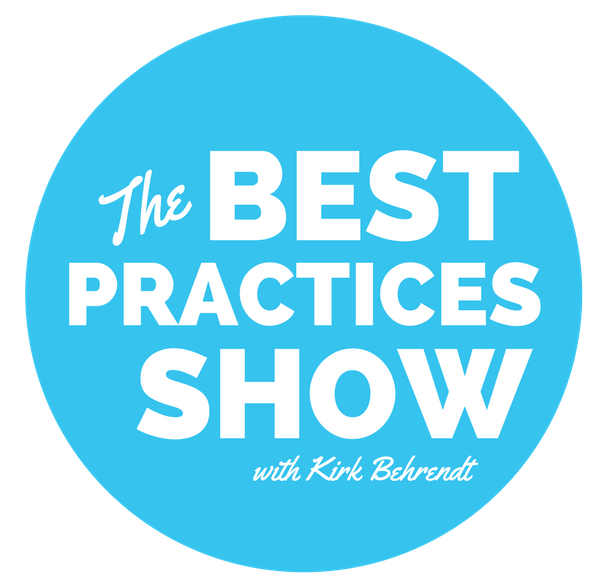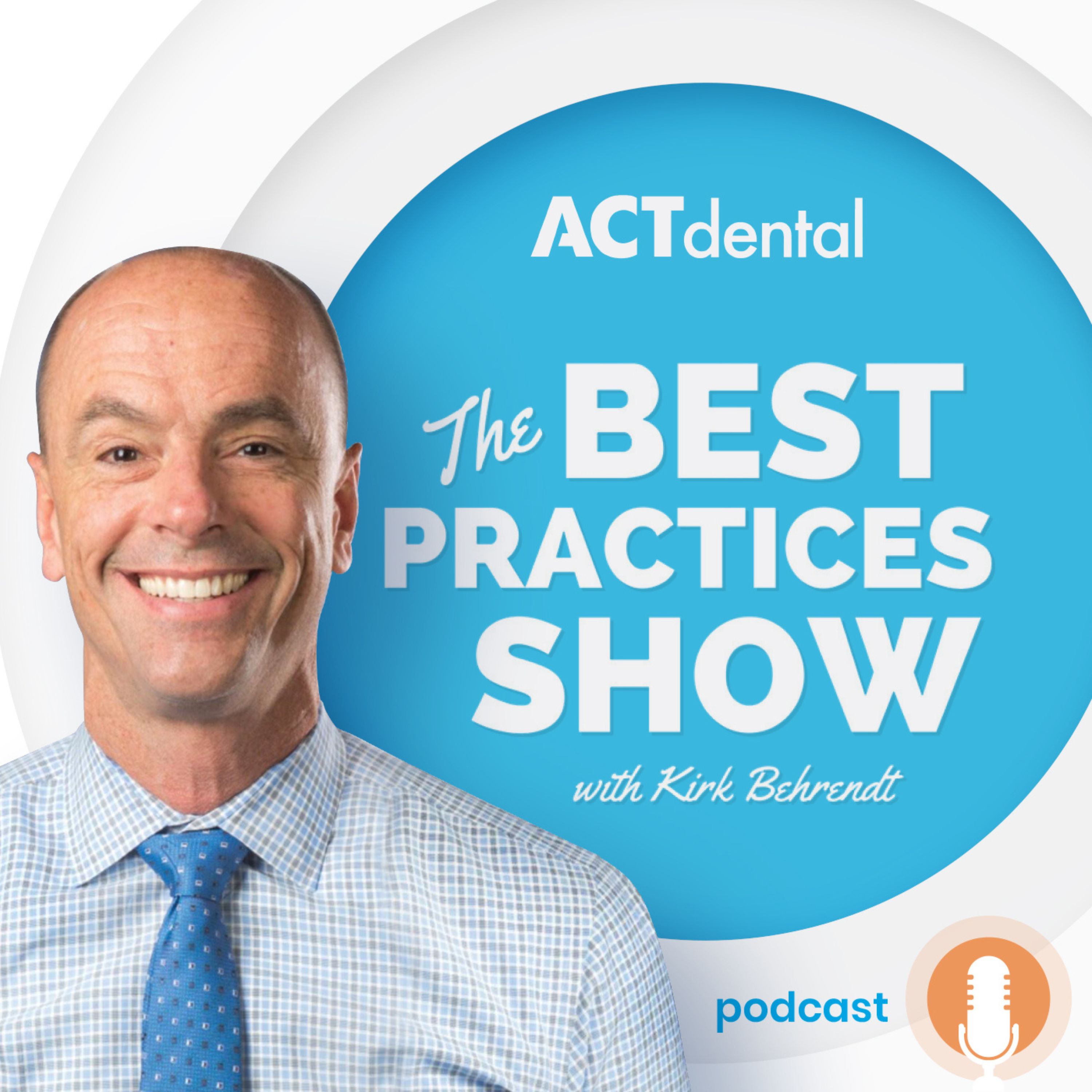Episode 643
643: The Total Health Dental Practice - Dr. Susan Maples
643: The Total Health Dental Practice - Dr. Susan Maples
People today are living longer — but lifespan doesn't always equal healthspan. Luckily, there is a way to extend health, and it can be done through dentistry. To share how, Kirk Behrendt brings in Dr. Susan Maples, author of BlabberMouth and Brave Parent, to explain total health dentistry, why it’s important for your practice, and how to implement it effectively. Put health and care back into healthcare! To learn more about the preventive care you can offer, listen to Episode 643 of The Best Practices Show!
Episode Resources:
- Join Dr. Maples on Facebook
- Follow Dr. Maples on Instagram
- Subscribe to The Best Practices Show podcast
- Join ACT’s To The Top Study Club
- See ACT’s Live Events Schedule
- Get The Best Practices Magazine for free!
- Write a review on iTunes
Links Mentioned in This Episode:
Read Brave Parent by Dr. Maples
Read BlabberMouth! by Dr. Maples
Learn more about Total Health Academy
Learn more about APDP
Learn more about AAOSH
Main Takeaways:
Total health dentistry will give you a competitive advantage.
Put the “health” and “care” in your healthcare as a dentist.
Do more than polishing teeth and looking at calculus.
Many diseases can be linked to oral health.
Quotes:
“Seventy-five percent of what we're spending on healthcare is preventable to begin with. But who is doing the prevention? We call ourselves a preventive visit, right? So, doing something weird inside that space that we call a six-month recall — stop polishing the teeth, and stop throwing toothbrushes in bags. Start helping people dig into what they want to become in life. It makes a huge difference in their life.” (6:05—6:31)
“If you are attracting patients who value health, they're much more likely to spend their money on their values, which means that they're not as insurance dependent. So, if you're looking for insurance independence and you're looking to have conversations with people about a comprehensive treatment plan where you could literally bring that to fruition, that's the target market — people who value health.” (7:37—8:04)
“I always say what's missing in healthcare today is health and care.” (10:43—10:47)
“Early on in my career, I learned that hiring had to be values-based hiring. If you think about any dual relationship, whether it's a breakup with a boyfriend, girlfriend, a divorce, or a parting of ways with a family member — anything — it's generally because we have this values rift. It's not because of anything else. We just value different things. And so, the idea that we would hire people based on values — which means you have to know your values. So, in our practice, we have a very distinct set of core values. You can see them on our website. There are six of them. When we interview people, we ask open-ended questions that get out what their values are. Not, ‘Do you like our values?’ but, ‘What are your values?’ We don't ask them that. We start to ask questions. For instance, if we like continual learning, we want to ask questions like, ‘Tell me what you've done for your own learning this year out of your own volition.’ And if they can't answer that, there's a pretty good chance they're probably not a continual learner. So, things like that. We tend to hire for values, which means that we end up with people who are not the same personality. They don't have the same credentials. We're all different that way, which is good because we serve a variety of people. We need to have different personalities. But our values are right on.” (13:45—15:13)
“If you're not getting along with someone on your team, generally, you can pick out the value that you have that is different from theirs. It's not right or wrong, it's just different.” (15:53—16:04)
“[Total health is] an individualized approach to care. So, in dentistry, we tend to do things by protocol. We bring our new patients in hygiene. We sit them down. We take a health history. We maybe take a blood pressure. We do an oral cancer screening. We look around with a perio probe. [In my practice], we don't do it that way. We start with a two-hour initial exam. This is for adults. This is the adult intake, a two-hour initial exam. We start out with an interview — the word interview comes from the word, “entre vous”, which means to see one another — in a library where there's not a dental environment, and we talk together. We have a facilitated conversation where we say, ‘Tell us about you.’ And then, we start to get into health. ‘What's most interesting to you about your own personal health or health challenges?’ And then, we stay in the question, as Mary Osborne teaches. We follow their lead, and we go where they go. When we've exhausted things like sleep and gut function, and you've done all of that — or if they start with dentistry, I'll start with dentistry. But then I'll say, ‘Tell me a little bit about your mouth and what it's been like for you to have been a dental patient all these years. What's going on there?’ So, we go through all that. We probably spend maybe 40 minutes, maybe an hour, before we ever get them in the clinical setting. And now, you've really made an investment in their life, and you're really putting together some pieces, discovering what they know about themselves. Then, I'm going to put that up against what I learn about them in the clinical setting. And then, we'll have a dialogue about what we can do to get them there. We're really wanting to help people become their best selves.” (16:29—18:22)
“When I first went into dentistry, my dad was an entrepreneur. He wanted to know, ‘How do you make money in dentistry?’ Because I bought a practice right out of school, 25 years old. I was trying to figure it out. I said, ‘Well, you charge by the surface. So, a filling is on the top of the tooth. It's one price. If it leaks over to the side, it's called a two-surface.’ I'm explaining this to someone who knows nothing about teeth. And he goes, ‘Oh my goodness, Sues. You are getting paid by the surface? You’ve got to shut up and work.’ He's like, ‘You need to be paid by the syllable.’ I thought, ‘Oh my gosh, I'm going to have to stop talking and really drill.’ I think that's kind of where dentistry has gone. But I have to tell you that, now, I'm getting paid by the syllable. And it's really, the more syllables that come out of the patient's mouth, the more they feel understood and trusting. The higher that treatment plan acceptance goes, the more we're able to do the dentistry the way we would like to do it. Giving the patient the lead is really a competitive advantage for treatment plan acceptance and for referrals. There is nowhere in healthcare that I know that people have as much time with the doctor as they have with me, and I'm able to help put all those pieces together. While all my friends are retiring, I feel like I'm having the best time, getting the hang of it, really helping people steer their life toward their best self yet.” (18:24—19:54)
“Seventy-five percent of what we're suffering from is preventable. But we're not doing any prevention in medicine. We're spending $1 out of $100 in prevention across the board, including dentistry . . . Dentistry has the last pillar of prevention left, and it's that hygiene visit. People are coming to you presumably healthy, and they're asking you to take care of a preventive visit. And we're doing all kinds of things in that visit that has no efficacy in the literature, like polishing teeth. We have to really break the mold and say we need to be individualized in our care. We need to help predict and preempt dental disease.” (20:44—21:37)
“Teeth should never dissolve. That's a pH problem. Why is that? Is it because there's acid coming up? Is it because we're consuming acidic foods? Is it because the sugar is feeding the strep mutans and it's producing acid? That's one disease. Periodontal disease is so multifaceted and so connected to everything else. I mean, look at the research on Alzheimer's. Most of these Alzheimer's patients have Treponema denticola and P. gingivalis in their brains. These leaky gums are creating problems, and everyone knows about it now. So, we need to look at this as a systemic problem with a host immune response that is horrific, and what do we need to do to help get that patient healthy? What about sleep? What about nutrient deficiencies? What about chemical sensitivities? What about addiction and alcoholism? What about depression where they stop caring for their teeth? Like, what are the pieces that we're missing where we can't seem to control this disease?” (21:37— 22:39)
“Right now, the health trajectory looks like people are going to be living a little less long. But we're already living long. The question is not lifespan, it's healthspan. The problem right now is that the last 30 years of our life are crappy years. I personally want to live like this and have one bad day. I'm approaching 64, so maybe I have another 40 years. I don't know. I'm thinking maybe 94, 104, something like that. I want to live a long, healthy life, and then die an unexpected death, maybe skiing or something. I don't know what I would be doing. But the point of the matter is, wouldn't it be cool if our healthspan could match our lifespan? It gives us a really new perspective on how we look at life, because I know I do not want multiple medications and all of the problems that come with that. None of us do. Right?” (23:11—24:08)
“I think that there is fear, and we live in a society that values money so much that people are always trying to give the worst-case scenario, ‘What if I try this and I fail? What if I don't make money at it?’ I think if you do the right thing, the profits come. I can tell you that I do a shit-ton of...


